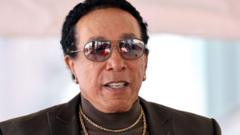In a developing narrative that underscores the intersection of power, culture, and preservation, the Trump family is facing scrutiny over a significant real estate venture in Serbia. Jared Kushner, President Trump’s son-in-law, has struck a half-billion-dollar deal with the Serbian government to establish a Trump-branded hotel and residential complex in the heart of Belgrade. The site, however, is steeped in historical significance, being the location of a bombed-out structure that represents the hardships endured by Serbians during the 1999 conflict.
This controversial project faced its most substantial obstacle when local cultural preservationists placed themselves firmly against the plans. Following the Serbian government's controversial decision to deregulate the cultural status of the site—effectively paving the way for the construction—dozens of architects and historians voiced their dissent. They contend that such a move violated established legal protections for culturally significant sites, as outlined by the Republic Institute for the Protection of Cultural Monuments.
Estela Radonjic Zivkov, a former deputy director at the institute, revealed the pressures she faced from state intelligence officers to abandon opposition to the project. Despite this, she and other experts insisted on the importance of maintaining the cultural heritage associated with the bombed building, which has long been recognized as a symbol of collective national suffering.
The controversy surrounding this initiative has escalated tensions between cultural advocates and government officials, leading to the announcement of a criminal investigation into local authorities involved in the approval process. As the Trump Organization—now run by Donald Trump’s sons, Eric and Donald Jr.—stands poised to capitalize on this development, it raises significant ethical questions about foreign investments, cultural preservation, and the implications of political connections on business decisions.
This controversial project faced its most substantial obstacle when local cultural preservationists placed themselves firmly against the plans. Following the Serbian government's controversial decision to deregulate the cultural status of the site—effectively paving the way for the construction—dozens of architects and historians voiced their dissent. They contend that such a move violated established legal protections for culturally significant sites, as outlined by the Republic Institute for the Protection of Cultural Monuments.
Estela Radonjic Zivkov, a former deputy director at the institute, revealed the pressures she faced from state intelligence officers to abandon opposition to the project. Despite this, she and other experts insisted on the importance of maintaining the cultural heritage associated with the bombed building, which has long been recognized as a symbol of collective national suffering.
The controversy surrounding this initiative has escalated tensions between cultural advocates and government officials, leading to the announcement of a criminal investigation into local authorities involved in the approval process. As the Trump Organization—now run by Donald Trump’s sons, Eric and Donald Jr.—stands poised to capitalize on this development, it raises significant ethical questions about foreign investments, cultural preservation, and the implications of political connections on business decisions.



















